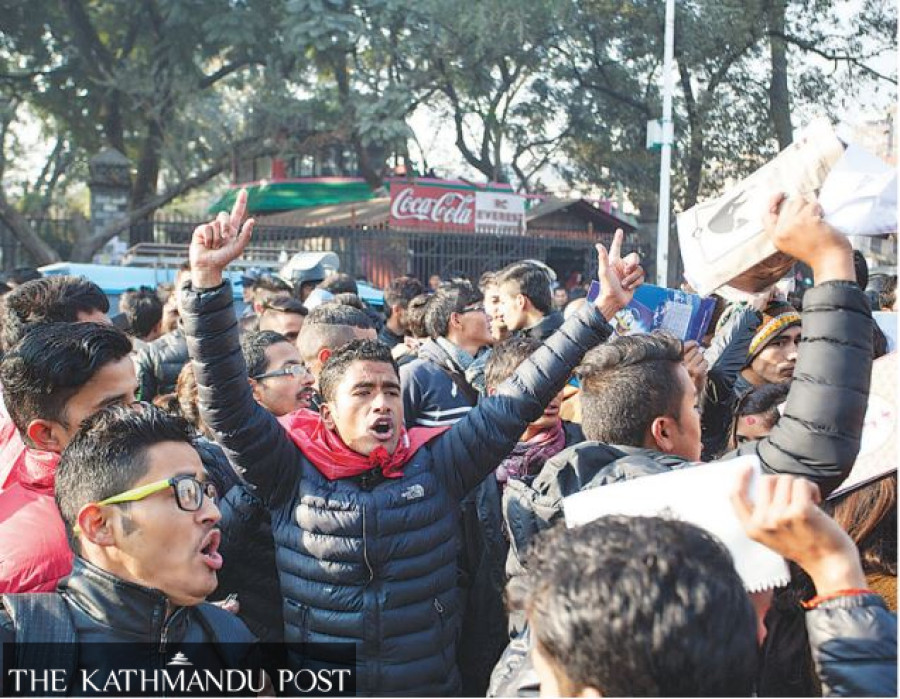Politics
Hand-picking leadership in sister wings, parties undermine democracy
Political observers say appointing the leadership—be it in the mother parties or in the sister wings—reflects the dwindling democratic practice among the parties.
Binod Ghimire
Sunita Baral, vice-chair of the All Nepal National Free Students’ Union, a sister wing of the CPN-UML, was nominated chairperson of the union on September 18.
Along with Baral two other office bearers of the UML’s student wing were in the race to become the union’s chair. However, the leadership of the mother party intervened, compelling two other aspirants to settle for vice-chairpersons. The party didn’t allow the democratic way—voting—for the position. Ever since 2016, when Nabina Lama was elected chairperson of the union, it hasn’t held its convention.
The union’s General Secretary Ain Mahar was appointed coordinator of the student wing of the Nepal Communist Party (NCP) formed after a merger of the UML and the CPN (Maoist Centre) in 2018. Baral’s handpicking was a second incident in the student wing of the main opposition party.
The trend of handpicking the leadership of the sister wings is not limited to the main opposition. On September 7, Suman Devkota was appointed coordinator of the Young Communist League, a youth wing of the CPN (Maoist Centre). Subodh Raj Sherpaili too was one of the contenders for the position.
However, Sherpaili had to give up after the leadership of the mother party stood for Devkota. Though there was dissatisfaction within the Maoist Centre’s youth wing, it succumbed to the decision of the party leadership.
The Maoist Centre itself hasn’t held its general convention since 2013 when Pushpa Kamal Dahal, who has led the Maoist party for over three decades now, was re-elected party chair. The party had said it would hold a “special convention” within one year. The party was then named UCPN (Maoist Centre). The special convention was never held.
The party has been postponing the convention for over eight years saying it merged with various parties at different times and this has even led to the change in the name of the party.
Political observers say handpicking the leadership be it in the mother parties or in the sister wings reflects the dwindling democratic practice among the parties.
“The sister wings used to be the platforms to generate the new leadership,” said Rajendra Maharjan, a political columnist with Kantipur, the Post’s sister paper. “They have become dull now due to interventions by party leaderships.”
Maharjan said the trend of handpicking the leadership in the sister wings is increasing as the leadership of the mother parties become more centralised gradually.
Incumbent Prime Minister and President of Nepali Congress came to mainstream politics through student politics. He is the second president of the Nepal Students’ Union. Many Congress leaders including incumbent Home Minister Bal Krishna Khand were in student politics before joining party politics.
However, most of the sister wings of the Nepali Congress haven’t followed the democratic way of leadership selection for years. Rajib Dhungana, President of Nepal Students’ Union was picked by the party in January last year, without following any democratic process for the selection.
In the lack of general conventions the ruling party has been either handpicking the leadership or giving continuity to the existing committees through party orders. “Those in the sister wings are the future leaders of the respective parties. If they follow the trend of handpicking the leadership they will follow suit when they are in power,” Meena Vaidya Malla, a former professor of Political Science at the Tribhuvan University, told the Post. “If the parties are committed to democratic norms and values, they should allow free competition.”
The general convention of the All Nepal National Independent Students’ Union (Revolutionary) affiliated to the Maoist Centre has been slated to commence on September 13 after several postponements. Incumbent Vice-Chairpersons Surendra Basnet, Pancha Singh and Bijay Devkota among others are in the race for chair. However, there is a fear among the aspirants for chairperson and other crucial positions that the party will intervene and won’t allow a free competition.
“We are pushing for a free competition but I don’t think there will be voting,” a secretary of the union, who is an aspirant for a general secretary, told the Post on the condition of anonymity. “If the party intervenes I will have to settle for whatever post they want.”




 13.12°C Kathmandu
13.12°C Kathmandu














